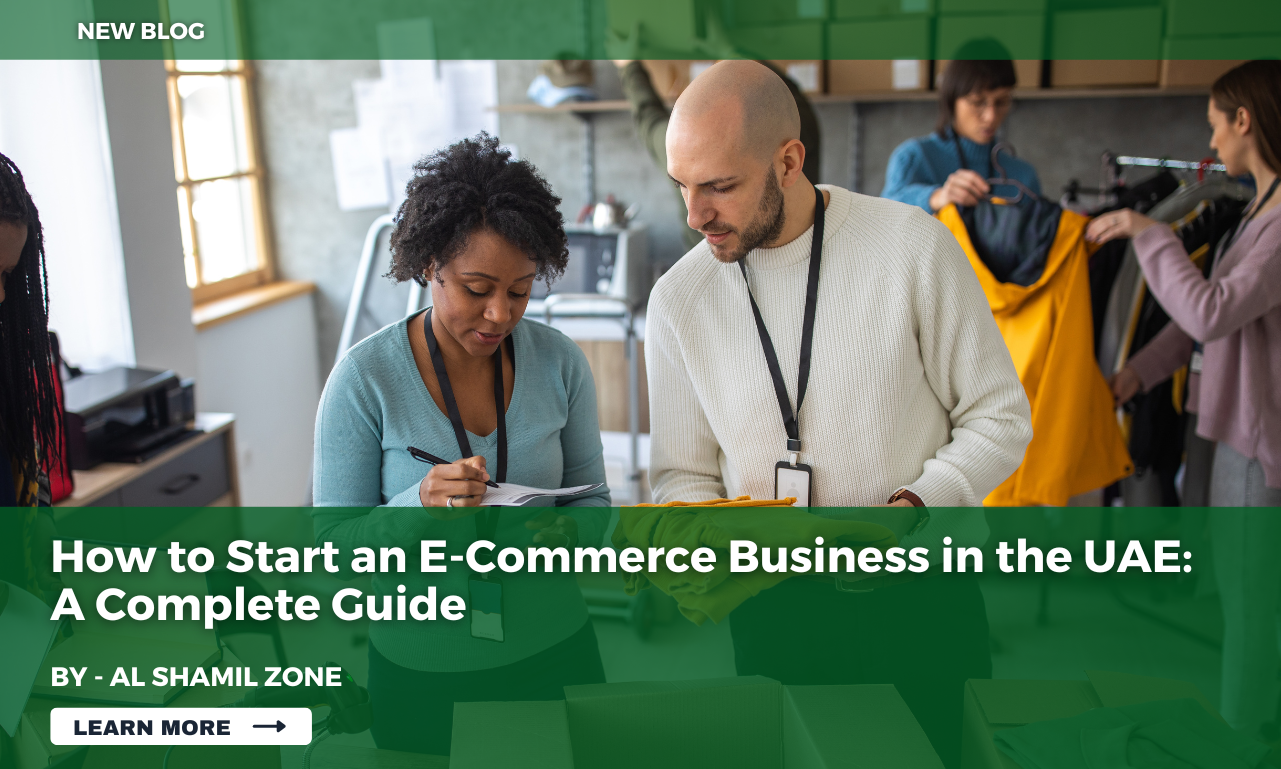Starting an e-commerce business in the UAE has never been more promising. With the UAE's booming digital market, strategic location, and supportive government policies, entrepreneurs can tap into both local and international customers with ease. This guide will walk you through the essential steps to launch your e-commerce business successfully in the UAE.
### Why Start an E-Commerce Business in the UAE?
The UAE has a flourishing online marketplace, with an increasing number of consumers shifting to online shopping. Here are some reasons why the UAE is ideal for e-commerce:
- **Tax Benefits**: No personal income tax and low corporate tax rates.
- **Strategic Location**: Access to major global markets.
- **Government Support**: Initiatives like UAE Vision 2021 encourage digital transformation.
- **High Internet Penetration**: Over 90% of the population is active online.
With these advantages, it’s no surprise that many entrepreneurs are keen to start their e-commerce ventures in the UAE.
### Step-by-Step Guide to Starting an E-Commerce Business in the UAE
#### 1. **Choose the Right Business Model**
When starting your e-commerce business in the UAE, you can choose between two main models:
- **B2C (Business-to-Consumer)**: Selling products directly to consumers.
- **B2B (Business-to-Business)**: Selling goods or services to other businesses.
Evaluate your products or services to decide which model fits your business goals.
#### 2. **Select a Jurisdiction: Mainland or Free Zone?**
One of the first decisions you’ll need to make is where to establish your business. You can either set up in the **Mainland** or a **Free Zone**.
- **Mainland**: Allows you to trade directly with the local UAE market without restrictions. You can also bid on government contracts and open physical stores.
- **Free Zone**: Ideal for e-commerce businesses looking for 100% foreign ownership, zero taxes, and simplified company formation. Popular Free Zones for e-commerce in the UAE include:
- **Dubai CommerCity**
- **RAKEZ (Ras Al Khaimah Economic Zone)**
- **Ajman Free Zone**
- **Sharjah Media City Free Zone (Shams)**
#### 3. **Obtain an E-Commerce License**
To operate legally, you need an **e-commerce license**. This can be obtained from the Department of Economic Development (DED) if you’re setting up in the mainland, or from the relevant authority if in a free zone.
- **For Mainland**: The process involves registering your business with the DED and applying for an e-commerce license under the "General Trading" or "E-Trader" category.
- **For Free Zones**: Free zones offer simplified processes for obtaining licenses. They also provide packages tailored to e-commerce startups, such as free website development or hosting services.
#### 4. **Choose a Suitable E-Commerce Platform**
Your e-commerce website is the core of your business. You can either:
- Use **third-party platforms** like Shopify, Magento, or WooCommerce, which offer plug-and-play options for e-commerce businesses.
- **Develop a custom website** to have complete control over functionality, design, and scalability.
Make sure your platform provides secure payment options, user-friendly navigation, and mobile compatibility to enhance customer experience.
#### 5. **Register for Payment Gateways**
To run a successful e-commerce business in the UAE, you’ll need a reliable **payment gateway** to accept online payments securely. Some of the popular payment gateways in the UAE include:
- **Telr**
- **PayTabs**
- **Checkout.com**
You can also integrate international options like **PayPal** or **Stripe**, but make sure to compare transaction fees and service availability before deciding.
#### 6. **Set Up Logistics and Shipping**
Efficient logistics and shipping are essential for customer satisfaction in e-commerce. In the UAE, you can either:
- **Partner with local couriers** like Aramex, Fetchr, or Emirates Post for domestic deliveries.
- **Use third-party logistics (3PL) providers** to manage warehousing, inventory, and shipping.
Make sure to provide customers with real-time tracking options and clear shipping policies.
#### 7. **Comply with UAE Regulations**
Ensure your business complies with all relevant regulations, such as:
- **Consumer Protection Laws**: Provide transparent pricing, return policies, and data protection.
- **VAT (Value Added Tax)**: E-commerce businesses must register for VAT and comply with filing requirements if their revenue exceeds AED 375,000 annually.
#### 8. **Market Your E-Commerce Business**
Digital marketing is crucial for attracting traffic and driving sales to your website. Consider these strategies:
- **SEO (Search Engine Optimization)**: Optimize your website with keywords related to your products or services to rank higher in search engines like Google.
- **Social Media Marketing**: Platforms like Instagram, Facebook, and LinkedIn are highly popular in the UAE and can drive brand awareness and engagement.
- **Pay-Per-Click Advertising (PPC)**: Google Ads and social media ads can help you reach a targeted audience quickly.
#### 9. **Leverage Al Shamil Zone for Business Setup**
At **Al Shamil Zone**, we specialize in making the business setup process easy and hassle-free. We offer:
- **Business Setup Consultation**: Expert advice on choosing the right jurisdiction and license for your e-commerce business.
- **Paperwork and Licensing**: We handle all paperwork, from obtaining your e-commerce license to registration.
- **Tailored Solutions**: Customized packages, including visa processing, establishment cards, and bank account setup.
### Conclusion
Starting an e-commerce business in the UAE can be both exciting and lucrative. The UAE offers a favorable environment for entrepreneurs, from its tax benefits to its tech-savvy consumer base. By following these steps and partnering with a trusted business setup provider like **Al Shamil Zone**, you can successfully launch and grow your e-commerce venture in the UAE.

Business Consultant ( Tagalog & English )
Khizia Marie
Online
Khizia Marie
Online

Business Consultant (English, Arabic, French)
Souad Birafane
Online
Souad Birafane
Online

Business Consultant (English, Urdu)
Syed Mehdi
Online
Syed Mehdi
Online

Business Consultant (English, Sinhalese)
Prasal Andaraweera
Online
Prasal Andaraweera
Online

Business Consultant (English, Urdu, Hindi)
Adnan Amin
Online
Adnan Amin
Online





















